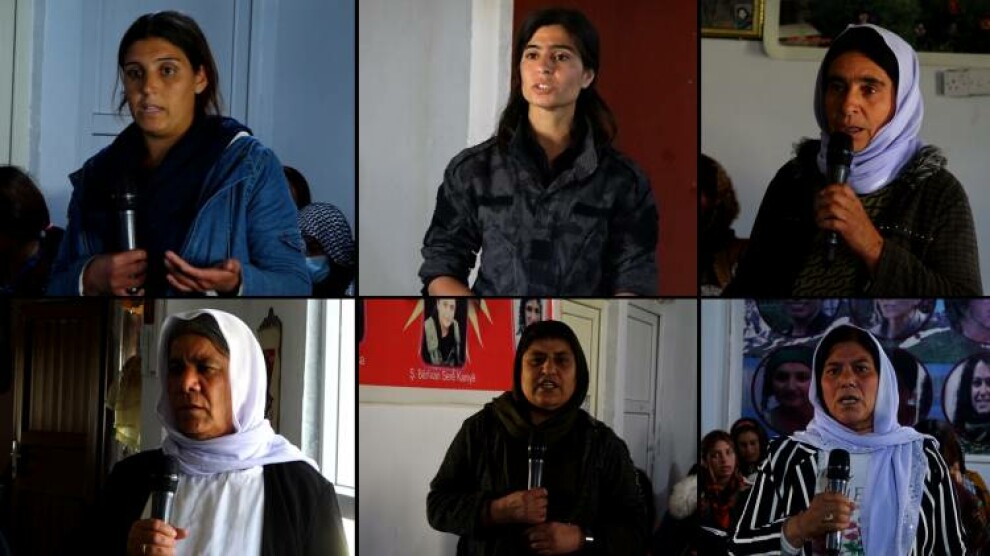Êzidî women defend Shengal

Êzidî don’t recognize the Shengal (Sinjar) Agreement signed between the federal government in Baghdad and the Kurdistan Regional Government (KRG). Women say they will defend Shengal to the end.
SITÎ ROZ-ELMAS NAYIF
Shengal- Êzidî women continue to react to the Shengal (Sinjar) Agreement signed between the federal government in Baghdad and the Kurdistan Regional Government (KRG) on October 9, 2020. The women call on Iraqi Government and Kurdistan Regional Government to act responsibly towards the Êzidî people and accept their demands. The Êzidî Women's Freedom Movement (TAJÊ) and Shengal Women Units (YJŞ) held a press conference. At the press conference, women often reminded ISIS attacks took place in Shengal on August 3, 2014, and said, “The powers that didn’t defend us at that time have no right to talk about us now.”
At the conference, TAJÊ Coordination member Xoxê Cindî called on the Êzidî people to support the tent action launched by Êzidî people against the agreement.
“We will continue to protect our mountains and our people”
One of the Shengal Women Units (YJŞ) commanders Axîn Întîkam made a speech at the conference, “The demand of the Kazimi Government to take control of the mountains, which are the sacred places of the Êzidî, and to take the weapons of the defense forces, is the last straw. This approach is a hostile attitude. Demanding the fighters, who promise to protect these lands to lay down their weapons, is an insult against them. Until now, we have never bowed to any attacks and threats against Shengal and they know our determination. As the children of these lands, we will continue to protect our mountains and people. Baghdad-Erbil-Turkey alliance is already lost against women’s resistance.”
“What does Iraq want from us?”
After the speech of Axîn Întîkam, members of the Êzidî Women's Freedom Movement (TAJÊ) made speeches. Kine Xidir is one of them. Stating that they have been trying to heal their wounds for seven years, Kine Xidir said, “The Iraqi Government hasn’t stood by us even one day. Our people lost their lives in the mountains were eaten by wolves and birds. We still hear the screams of Êzidî women. Thousands of people were killed in front of us; thousands of women were abducted by ISIS. Now, we are asking, where was the Iraqi government at that time? What has it done to heal our wounds? It has done nothing and now it is threatening our presence in Shengal every day. What does it want from us?”
Cindî: Shengal is our honor
Xoxê Cindî is also a member of the Êzidî Women's Freedom Movement (TAJÊ) and an activist launching action against the agreement. At the conference, Cindî said that they have the will to protect, govern and defend themselves, “Since August 3, 2014, we have been resisting and fighting along with our children. We will not allow any power to once again try to colonize our lands. We will resist along with our children against those who want to occupy our lands and honor.”
“We will protect both ourselves and our culture to the end”
Cindî talked about the Iraqi government’s purpose and she said, “We know very well the intentions of the Iraqi Government and those who made a deal with it. Against the powers that want to annihilate us, we say; you have to kill all of us because we will never bow down you. The Iraqi government wants us to bow down, and Shengal to bow down. They want to launch a new edict against us. We trust only our forces no other forces. We will protect both ourselves and our culture to the end. I call on all Êzidî people to do their best to prevent them from entering Shengal.”
What had happened?
On October 9, 2020, the Shengal (Sinjar) Agreement was signed between the federal government in Baghdad and the Kurdistan Regional Government (KRG). The agreement says the Shengal Democratic Autonomous Administration will be dissolved, the security forces will be disarmed and the checkpoints will be controlled by Iraqi military forces. But the people of Shengal announced that they will never accept the agreement and launched a tent action. The tent action has been carried out by Êzidî people for 114 days.
